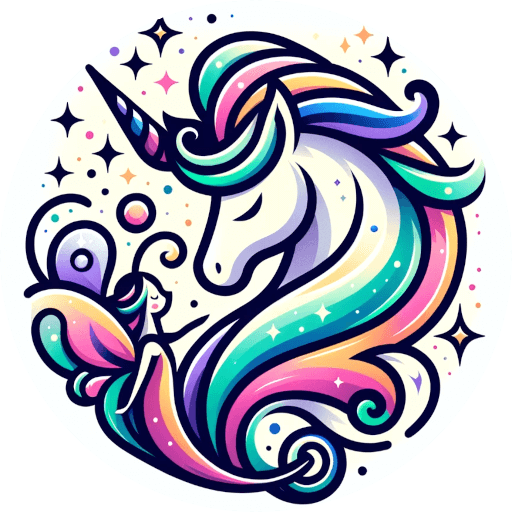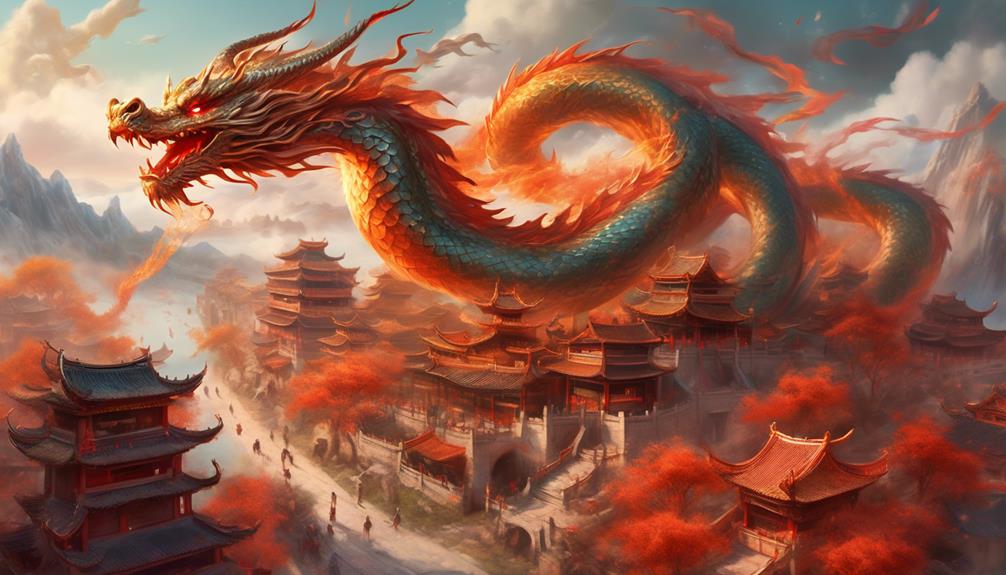Have you ever wondered about the true significance of dragons in Chinese folklore? Dragons have long been a prominent symbol in Chinese culture, representing various virtues and embodying a rich mythology.
But what do these mythical creatures truly symbolize in the context of Chinese folklore? Understanding the role of dragons in Chinese culture and mythology can offer valuable insights into the beliefs and values that have shaped the traditions and customs of this ancient civilization.
Key Takeaways
- Chinese dragons are associated with good luck, imperial power, and strength.
- They are believed to control the weather, water, and the earth, with the Dragon Kings ruling over the seas and waterways.
- Chinese emperors were believed to be the incarnation of dragons.
- Dragons symbolize excellence, determination, and dignity in Chinese mythology, and are believed to bring good luck during festivals like the Chinese New Year.
Origins of Chinese Dragon Symbolism
The origins of Chinese dragon symbolism can be traced back to multiple theories that suggest various animal influences and cultural beliefs. Chinese dragons, traditionally considered as imperial symbols, have been associated with good luck and are an integral part of Chinese culture. They're also linked to the Chinese Zodiac, with the Year of the Dragon being particularly significant.
These mythical creatures are revered as symbols of power, strength, and good fortune. In Chinese folklore, dragons are believed to control the weather, water, and the earth. The Dragon Kings, who are revered in Chinese mythology, are said to rule over the seas and waterways.
Chinese dragons have various animal-like forms, such as turtles and fish, and are considered to symbolize potent and auspicious powers in Chinese tradition.
Significance of Dragons in Chinese Culture
Amidst the rich tapestry of Chinese cultural symbolism, the significance of dragons unfolds as a multifaceted emblem associated with power, excellence, and divine representation.
In traditional Chinese culture, dragons were revered as symbols of imperial power, and Chinese emperors were believed to be the incarnation of dragons. The Chinese dragon is deeply woven into the fabric of Chinese folklore, representing good luck, strength, and the embodiment of the emperor.
During the Chinese New Year and other celebrations, dragon dances are performed to bring good fortune and prosperity. Unlike the Western dragon's negative connotations, the Chinese dragon is associated with beauty, wisdom, and friendliness.
Its influence extends beyond Chinese borders, shaping the impression of dragons in other Asian countries and serving as a national emblem in Chinese tradition.
Role of Dragons in Chinese Mythology
In Chinese mythology, dragons play a pivotal role as revered symbols of power, divinity, and auspicious influences. Dragons in Chinese culture symbolize excellence, determination, and dignity. The dragon represents royalty and wealth, and is often associated with valiancy.
In Chinese mythology, the dragon is a symbol of potency and auspicious powers. It's also believed that Chinese people are descendants of dragons. Dragons are incorporated into various aspects of Chinese culture, including pictures, festivals, and characters in the Chinese language.
The role of dragons in Chinese mythology extends to celebrations like the Chinese New Year and dragon dances, where they're believed to bring good luck. Chinese dragons differ from Western dragons, as they're associated with beauty, wisdom, and friendliness, and have influenced the perception of dragons in other Asian countries such as Korea, Vietnam, and Japan.
Chinese Dragon Symbolism in Imperial Authority
Symbolizing imperial authority, the Chinese Dragon held immense significance during the Tang Dynasty. Chinese Emperors and high officials were believed to embody the spirit of dragons, cementing the dragon's association with power and control. The dragon was a symbol of imperial authority and was exclusively used to represent the emperor and high-ranking officials, with specific dragon designs denoting hierarchical rank.
The image of the Chinese dragon remained relatively unchanged for centuries, reflecting its enduring importance in imperial symbolism. Dragon motifs adorned imperial garments, architecture, and artifacts, emphasizing the dragon's role in symbolizing authority. Furthermore, dragon amulets and totems were utilized to invoke the power and protection associated with the imperial dragon.
This symbolism of the dragon in imperial authority influenced the depiction of dragons in other Asian countries and was a prominent emblem in Chinese tradition.
Influence of Dragons in Modern Chinese Practices
Continuing to hold immense cultural significance, dragons remain deeply ingrained in modern Chinese practices, with their influence felt across various aspects of contemporary Chinese society.
From corporate logos to fashion trends, the dragon continues to symbolize power, strength, and good fortune in Chinese folklore, shaping modern Chinese practices.
Dragon dances and dragon boat races are integral to many Chinese festivals, showcasing the enduring presence of dragons in Chinese society.
The dragon's association with the imperial family further solidifies its influence, as it's still revered as a symbol of authority and prosperity.
Additionally, the incorporation of dragon symbolism in martial arts reflects its significance in promoting values such as agility and resilience.
Frequently Asked Questions
What Do Chinese Dragons Symbolize?
Chinese dragons symbolize powerful creatures with deep cultural significance. They hold symbolic meaning in ancient legends and are revered for their mystical qualities. Their artistic representation and spiritual beliefs reflect historical context and mythological origins.
What Is the Chinese Myth of Dragons?
The Chinese myth of dragons originates from ancient folklore, depicting dragons as symbols of power, wisdom, and good fortune. Legends and beliefs surrounding dragons are integral to Chinese culture, influencing art, festivals, and ethnic identity.
What Does the Mythical Dragon Symbolize?
Dragons in Chinese mythology hold immense cultural significance, symbolizing power, excellence, and divinity. Their association with ancient legends, art, and folklore interpretations highlights their symbolic meaning as mythical creatures embodying wisdom, friendliness, and auspicious powers.
Why the Dragon Is Central to Chinese Culture?
The dragon is central to Chinese culture due to its rich cultural significance, artistic representation, and spiritual meaning. Dragon legends, dragon dances, and its role as an imperial symbol all contribute to its symbolic creature status.

